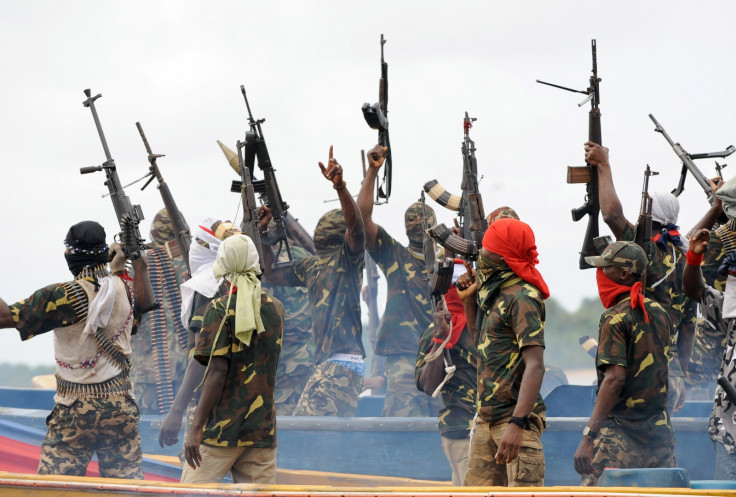Niger Delta Avengers bomb Shell oil pipeline due to government 'not addressing people's concerns'
NDA resumes attacks claiming government not addressing grievances of Delta's impoverished communities.
A militant group in Nigeria's oil-rich Niger Delta has claimed responsibility for an attack at a Shell-owned oil pipeline in Rivers State. The Niger Delta Avengers (NDA) said in a statement it attacked the Bonny pipeline on 23 September in retaliation to the government's "dramatisation of the so-called dialogue and negotiation process".
In August, the government and militant groups in the volatile Delta agreed on a month-long ceasefire following attacks by the NDA, which brought Nigeria's oil production to a 30-year low.
Vice-President Yemi Osinbajo claimed the country – Africa's biggest oil producer – now loses "over one million barrels of crude oil on a daily basis".
After repeatedly discrediting government claims that a ceasefire had been reached, the NDA – which emerged earlier in 2016 – reportedly agreed to a truce in August. However, the group has since resumed attacks.
In a statement on its website, the NDA said: "Since the cessation of hostilities and the commitment of the PAN Niger Delta Elders and stakeholders team, the Nigerian government and her agents are turning the expectations of the Niger Delta to shameful scenes obtainable in Nollywood acts and as well intimidation, blackmails and continuous profiling of Niger Delta sons and daughters. This is only a wake up call; we may not have other way to say it better [sic]."
More on NDA
Nigeria's oil and gas production threatened by new militants
NDA urge Buhari to visit communities in south-east as referendum calls grow
"The world is watching, time is running against the Nigerian state; while we were promised that the concerns of Niger Delta will be addresses once a truce is declared, the activities of the government and her agents are not assuring enough, there has been no progress and no breakthrough," the statement continued.
The NDA, the latest militant organisation to wage war against the Nigerian government, defines itself as a group of Niger Deltans dedicated to starting a "revolution to free Nigeria from the wicked administration".
The group vowed it will carry out attacks until the perceived marginalisation of people in the Niger Delta ends. Its demands include greater shares of oil revenues and the clean-up of areas affected by years of oil spills.

Government's response
Earlier this year, the army launched Operation Crocodile Smile to halt renewed violence in the Delta. Although military presence was subsequently reduced in the area in order to foster a dialogue with the militants, violence has continued.
In response to the military operation, a new group – the Niger Delta Greenland Justice Mandate (NDGJM) – launched the so-called Operation Crocodile Tears. The army deemed the militants' operation to be an act of terrorism.
In September, Nigerian President Muhammadu Buhari told Voice of America his government was willing to negotiate with NDA. However, he added that the military would continue its operation if the NDA refused to collaborate.
"If they are not ready for compromise, so be it. We are ready for them," he said.
Birth of militants in Niger Delta
Militant groups in the oil-rich Niger Delta region took hold in the early 2000s following the deterioration of living conditions blamed on the increase of oil-related activities by foreign corporations. Tensions flared up in local communities as some ethnic groups felt they were being exploited and did not benefit from the crude oil on their land.
The repeated oil spills that considerably damaged the environment and affected people's health further deepened communities' frustrations. After being elected in 2015, Buhari extended a 2009 amnesty granted to 30,000 former militants in the area.
© Copyright IBTimes 2025. All rights reserved.






















